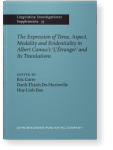Chapter 14
Les modalités dans L’Étranger et l’expression de
l’absurde
The central notion in
L’Étranger is that of the Absurd. However, it is not meant as a simple representation of experiencing absurdity, because the
novel would then have an unequivocal interpretation, in
contradiction with the ambivalent experience that it is supposed to
express. We show that the solution adopted by Camus is to use
linguistic modalities in a specific way. What characterizes the
narratives and the speech acts of Meursault is not the objectivity
or the absence of feeling, but the absence of axiological
modalities, while epistemic and appreciative modalities are present.
The first-person narrative thus invites the reader to share the
point of view of a character-narrator who formulates no value
judgment of moral or ideological nature on the world which surrounds
him.
Article outline
- 1.Introduction
- 2.L’absurde
- 3.Les dispositifs représentationnels
- 4.Les modalités
- 4.1Le paradoxe de Meursault: Entre subjectivité et objectivité
- 4.2Modalités et jugements
- 4.3Modalités appréciatives et axiologiques
- 5.Meursault et le refus de l’axiologique
- 6.Conclusion
-
Remarques
-
Références
Article language: French
